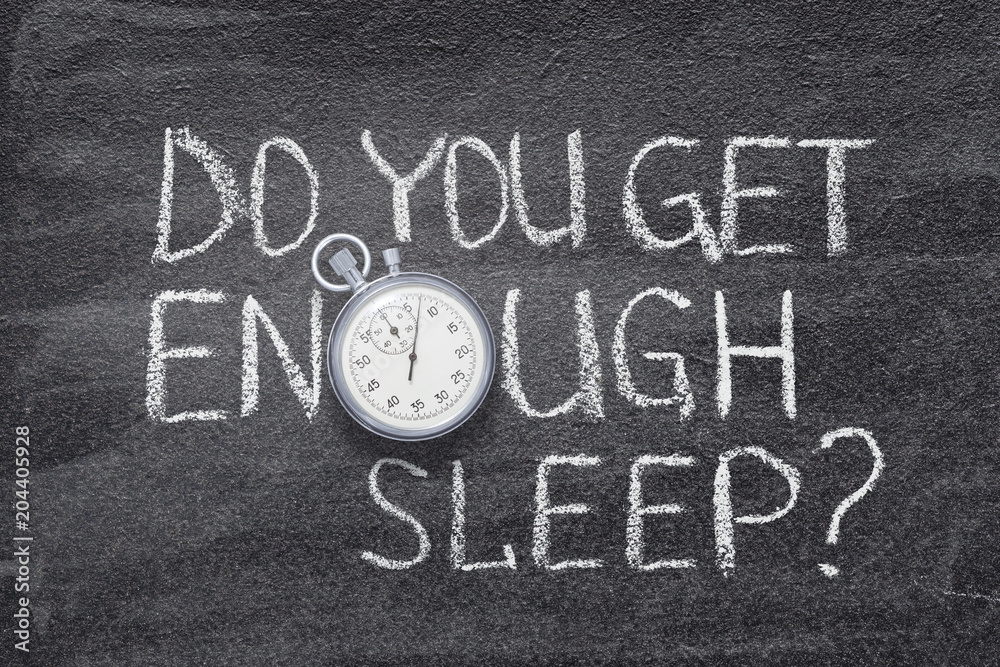With so much conflicting information available, you may have questions with where to even begin. In our Foundations series, we start with the basics and cover topics that are important to your health and wellness. We give you easy to digest information that answers your questions and hopefully leaves you wanting to know more! Today we explore Sleep. As a nation that seemingly prides itself on going non-stop, how would our health respond if we just rested?
If you are like millions of Americans, you find yourself moving sleepily from one task to the next. In an age where work rarely seems done, taking precious time for sleep seems laughable. But what if increasing your amount and quality of sleep actually put more time back in your bank?

Sleep basics
Sleep experts from around the globe recommend adults aim for between 7 and 9 hours nightly1. Sufficient quality sleep, or a lack thereof, is directly related to health processes throughout your body. The circadian rhythm is the method by which your body signals when it is time to sleep, and when it is time to wake. This sleep-wake cycle is governed by chemicals, namely cortisol, which triggers wakefulness, and melatonin which triggers sleep. As night approaches and your body starts to wind down, melatonin is released by the pineal gland, a small part of your endocrine (hormonal) system located in the back of your brain2.
As you progress through each stage of sleep, your body begins to repair and replenish itself.3 4
Stages of Sleep
Stage 1 Non-REM: Lasts under 10 minutes. Your body is minimizing recognition of outside stimulants and brain waves are slowing
Stage 2 Non-REM: Lasts 30-60 minutes. Brain wave activity further decreases. Heart rate and breathing slow and muscles relax. Most time is spent in this stage as you cycle through.
Stage 3 Non-REM: Lasts 20-40 minutes. This stage is critical for feeling rested. Here, your body begins producing slow delta waves and begins the process of restoring itself, consolidating memory and boosting the immune system. The length of time in stage 3 gets shorter throughout the night as more time is spent in REM sleep.
REM sleep: After an initial 90 minutes or so, your body first enters REM sleep. This is another deep stage where your body is processing creative blocks and is beneficial to memory and learning. REM is punctuated by an increase in brain activity. This is where dreaming commonly occurs. Thanks to a chemical GABA, your body is prevented from acting out dreams, although movement still occurs in the eyes.
Health Benefits of sleep
Sleep allows your body to eliminate toxins and cellular debris that accumulate throughout the day. Activities are processed and stored as memories and rejuvenation occurs. Consistent and high quality sleep is essential for your mental health and daily productivity.5
Over time, sleep deprivation is linked to chronic disorders such as high blood pressure, diabetes and obesity. Levels of stress hormones increase with sleep deficits, as does Ghrelin, a hormone related to hunger. Impaired glucose metabolism from these changes leads to metabolic diseases like diabetes, obesity and cardiovascular disease.6
Sleep improves the body’s immune system in multiple ways. During sleep, your body produces and releases cytokines, proteins that help regulate the immune response. Sleep helps the immune system “remember” pathogens. During deep sleep, the body strengthens the memory of past encounters with viruses or bacteria. T-cells, which play a vital role in fighting off infections, are also more efficient during sleep.
Because of the cellular cleanup that occurs during deep sleep, deprivation can also lead to a build up of toxins in the brain, beta and tau amyloid, which are attributed to Alzheimer’s disease and dimentia. ,7, 8
What causes insomnia?
The causes of insomnia are many. Implementing the tips and tricks below will get you going in the right direction.
If you are take any of the medications listed or suspect that your medication may be leading to sleep interruptions, please discuss with your doctor or pharmacist.
For the other recommendations, start with picking one or two and trying for a few weeks to see how they work. Change is hard and different for everyone.

Environmental causes
- Medications – medications can have an effect on various stages of sleep. Commonly prescribed medications may be responsible for increasing sleep latency, the time it takes to get to sleep. Others may disrupt REM sleep directly. And still others may cause middle of the night awakening.9 Always review your current medications and ask your doctor or pharmacist about effects on sleep.
- NSAIDS like ibuprofen and naproxen for inflammation cause a decrease in the chemical prostaglandin which leads to increased wakefulness.
- Beta blockers like metoprolol and carvedilol are used for blood pressure and heart rate control. These can suppress REM sleep and cause increased wakening throughout the night
- Antidepressants like sertraline, fluoxetine and duloxetine act on the neurotransmitter serotonin, and important part of the circadian rhythms. These medications increase the time falling asleep as well as how long it takes to get into REM sleep.
- Exposure to blue light – The wavelength of light produced by television, cellphones and other screens has a direct effect on our circadian rhythm. Activities such as watching TV or scrolling through your phone halts our body’s natural transition to sleep and can cause a delay in falling asleep or lead to frequent wakeups.10 11
- Stimulating activity – This goes hand in hand with exposure to blue light, as watching the news, scrolling through social media or playing a nice game of candy crush can get the adrenaline and cortisol in your body going which makes sleep difficult. Similarly, having a difficult discussion just before bed can do the same.11
- Exercise – while exercise is fantastic for your health, strenuous activity within several hours of bed can affect hormones like adrenaline and cortisol. The increased movement can also raise your body temperature which affects your circadian rhythm and makes falling asleep difficult.11 12
- Dietary habits – Consuming alcohol, caffeine or a large meal within hours of bedtime can lead to sleep disruptions. As alcohol breaks down in your body, the chemicals produced can cause your body to wake up. Caffeine being a stimulant affects both the ability to stay and get to sleep. And large meals, especially if high in sugar or fat can cause blood sugar disruptions and heartburn which affect your sleep cycle.11 12
Physiological causes
Other medical causes are also linked to variations in sleep patterns and can affect the quality of restorative sleep.13 If you experience any of these disorders, or suspect you do, speak with your doctor or a functional medicine practitioner for management.
- Sleep apnea – This is a serious medical condition where the body is not able to obtain proper oxygenation at night. In turn, the body “gasps” itself awake in order to get the necessary oxygen. Unfortunately, many people don’t even realize they have sleep apnea. If you are one who snores loudly, especially if you don’t feel rested, get this checked out asap.
- Restless leg syndrome – This is a neurological disorder marked by discomfort and an irresistible urge to move the legs. RLS tends to be worse in the evening and nighttime which leads to poorer quality of sleep. Massage, ice or warm packs, and good sleep hygiene are helpful in managing restless leg disorder. Symptoms worsen with sleep deficit and fatigue.
- Jet lag/shift work – In many industries, shift work is essential, however your health and the quality of sleep certainly suffer. The normal circadian rhythm of sleeping in the dark is flipped and can lead to difficulty get to or staying asleep. Melatonin can be helpful to this population and a strict bedtime routine is crucial.
Food and supplements
- Fatty fish – Omega 3 fats and vitamin D contribute to improved sleep through serotonin regulation which is important to the sleep-wake cycle. Fish such as salmon, tuna and trout are readily available fatty fish. Purchasing Wild caught fish is recommended to maximize nutritional benefit. Fish oil supplements are available over the counter with and without vitamin D. Vitamin D testing is important to avoid elevated levels, especially if already supplementing or receiving in a multivitamin.
- Magnesium – Responsible for over 300 enzymatic reactions in your body. Though magnesium is present in many foods such as leafy green vegetables, nuts, seeds and whole grains, many Americans are lacking these foods on a regular basis. Magnesium glycinate is preferred as the top formulation for sleep, although if you choose supplementation, I recommend a blend which will also provide support for muscles and fatigue. My favorite is available here on Fullscript.
- Melatonin – A naturally occurring hormone that increases in darkness and works opposite cortisol. Many foods such as tart cherries (juice also), pistachios, almonds and milk are high in melatonin. Supplements are available over the counter for temporary or sporadic use and are particularly helpful in jet lag or with a delay falling asleep. Start with a low dose of 1-2 mg about 30 minutes before bed to see how you react. Morning drowsiness is common with too high a dose.
- Nuts – The benefit of nuts on sleep come from many different angles. Pistachios, walnuts and cashews are especially high in melatonin, tryptophan and magnesium which boost your ability to fall asleep faster and longer. If you do go for a late night snack, a handful of nuts is a great choice!
- Tart Cherry Juice – Contains high levels of tryptophan, magnesium and melatonin to help regulate sleep. A nightly regimen is also part of a healthy bedtime routine. Be sure to opt for sugar free blends to avoid blood sugar disruptions overnight.
- Teas – Valerian root, chamomile and lemon balm are common teas that are associated with improved sleep. These teas contain a variety of compounds that are beneficial for promoting healthy sleep. A nightly cup of warm tea is also part of a healthy bedtime routine.
- Tryptophan – Needed to help make the neurotransmitters serotonin and melatonin which are both important parts of the sleep pathway. Foods high in tryptophan include turkey (hello Thanksgiving!), milk, grains like quinoa and nuts and seeds like pumpkin. Supplements are available, however because of a risk for side effects and potential drug interactions, speak with your provider or pharmacist before supplementing.
Tips and tricks
- Meditation – there are many different methods of meditation that are available for everyone. The traditional buddhist style of sitting with eyes closed, legs folded is one method. This pose may be difficult either mentally or physically for some. Instead, you can also practice breathing techniques where you focus on the breath or listen to a guided meditation on your favorite music app.
- Calming exercise – Yin yoga, gentle stretching or a relaxing walk help to slow the mind and prepare for sleep
- Vagal nerve stimulation – this is a fun one. The vagus nerve is the main connection to your parasympathetic nervous system (PNS) , the resting side. Engaging the PNS leads to enhanced digestion, slowed heart rate, improved immune function and more. (NCBI790). Methods of stimulating the vagus nerve include humming, gargling, cold water to the face (full immersion too, but probably not recommended just before sleeping!), and even massaging the outer ear lobe15.
- Routine – establishing a routine that you follow each night helps subconsciously prepare the body for sleep. This may include things like having a cup of tea while reading before bed, doing stretches or even the order in which you perform nightly hygiene. The importance is in the repetition that signals to your body that it is time to wind down.
- 10-3-2-1-0 – This is a group of recommendations to help guide you to restful sleep. 10 hours before bed, say no to more caffeine (so 1pm if you are aiming for an 11 pm shuteye. 3 hours before bed (8 in this analogy) limit food and alcohol, 2 hours before bed stop working, 1 hour before bed no more screens.
- 5-4-3-2-1 – this is a meditative and grounding technique which helps relax the body and mind, preparing you for sleep. This technique is particularly useful if you find yourself focusing on a future to-do list or worrying about something. First, you bring your attention to 5 things that you can see. Even in the dark you may be able to make out the edges of furniture or light from outside. Then, what 3 things can you feel? The weight of the blanket, the texture of your sheets? Next, focus on finding 3 sounds that you hear: the whooshing of the fan, cars on the street perhaps. Now find 2 things that you can smell and finally what 1 thing can you taste? As you work through these sensations, take slow inhales and exhales to help calm your body16

- Avoiding television/screens an hour before bed – This ties back to both the blue light exposure and stimulation discussed earlier. Though scrolling through your phone or watching a funny show may appear relaxing, they are causing your neurons to be excited and releasing stimulating hormones into your blood. Coupled with the effects of blue wave light, sleep can be elusive. Blue light blocking glasses are helpful if you read on your phone, but try to keep the content calming. Watching a political report or an exciting movie are best done several hours before bedtime
- 10-3-2-1-0 – This is a group of recommendations to help guide you to restful sleep. 10 hours before bed, say no to more caffeine (so 1pm if you are aiming for an 11 pm shuteye. 3 hours before bed (8 in this analogy) limit food and alcohol, 2 hours before bed stop working, 1 hour before bed no more screens.
- 5-4-3-2-1 – this is a meditative and grounding technique which helps relax the body and mind, preparing you for sleep. This technique is particularly useful if you find yourself focusing on a future to-do list or worrying about something. First, you bring your attention to 5 things that you can see. Even in the dark you may be able to make out the edges of furniture or light from outside. Then, what 3 things can you feel? The weight of the blanket, the texture of your sheets? Next, focus on finding 3 sounds that you hear: the whooshing of the fan, cars on the street perhaps. Now find 2 things that you can smell and finally what 1 thing can you taste? As you work through these sensations, take slow inhales and exhales to help calm your body16
To learn more about Functional Medicine and see how it may help you, schedule a free 15 minute consultation or head to our Work With Me page! Don’t forget to sign up for our newsletter below as we delve into topics like lifestyle medicine, ingredient highlights, medication concerns and more.
Anytime that you are experiencing a health concern, please contact a healthcare professional for guidance. In the meantime, ensuring that you are providing your body with the nutrients it needs and supporting it through sleep and stress reduction will always provide benefit. The content on this site is for informational or educational purposes only and does not substitute professional medical advice or consultations with healthcare professionals.
References
Click to expand
2. https://my.clevelandclinic.org/health/body/23334-pineal-gland
5. https://www.sleepfoundation.org/sleep-hygiene
7. https://www.nih.gov/news-events/nih-research-matters/sleep-deprivation-increases-alzheimers-protein
8. https://www.nih.gov/news-events/nih-research-matters/how-sleep-clears-brain
10. https://www.sbm.org/healthy-living/blue-in-the-face-the-effects-of-blue-light-on-sleep
11. https://health.clevelandclinic.org/sleep-hygiene
12. https://www.rupahealth.com/post/functional-medicine-approach-for-optimal-sleep
14. https://www.ncbi.nlm.nih.gov/pmc/articles/PMC9859770/
15. https://health.clevelandclinic.org/vagus-nerve-stimulation

Excellent article!
Very good
Awesome